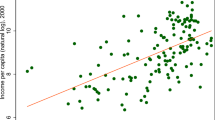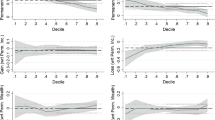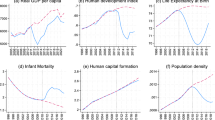Abstract
The statistical relationship between economic development and duration of democracy is one of the strongest in Political Science. Nevertheless, the theoretical mechanisms underlying this statistical link have been debated for decades. Adam Przeworski has proposed the simplest explanation, by indicating that wealth itself increases the probability of sustaining democracy, economic development and democratic stability are thus directly related. This paper discusses whether the assumptions of the influential model of Przeworski (Public Choice, 123(3–4):253–273. doi:10.1007/s11127-005-7163-4, 2005) are plausible, and extends the analysis to a setting in which: (a) absolute per capita income varies; (b) people have preference for democracy independently of income; and (c) consumption is subject to diminishing marginal utility. The analysis demonstrates that the mechanics proposed by Przeworski (2005) are particularly recursive. One of the assumptions in his model implies in and of itself the final conclusion of the analysis, and if this contentious cornerstone is removed or slightly changed, it is no longer possible to conclude that economic development could create per se any democratic equilibrium.


Similar content being viewed by others
Notes
Suffrage expansions associated with the rise of western democracies for example cannot be explained as simply a consequence of increases in voter income, there are other political and ideological factors that play a pivotal role in as well (Congleton 2011). In a similar vein, Apolte (2012) shows that due to collective-action problems amongst those oppressed by non-democratic regimes income inequality in not a sufficient condition for a democratic revolution to occur.
Both the analysis of institutional change and stability, as well as the study of the emergence of violent political conflicts -which is obviously related to institutional dynamics in extreme cases- had received several recent contributions worth of considering (Schneider and Wiesehomeier 2008; Congleton 2011; Apolte 2012; Esteban et al. 2012; Langer and Stewart 2013). These works share a common interest in incorporating to analysis a set of important political, ideological and institutional factors that are often neglected or set aside. In this sense collective action dilemmas; ideological shocks, and the ability to bargain over constitutional designs, have received renewed attention demonstrating its importance to explain constitutional developments and their stability.
Dictatorships not only redistribute income: they use force to repress their opponents and the threat of torture, or death is sufficiently foreboding that the same consumption generates lower utility when one’s physical integrity is threatened (Przeworski 2005: 257).
While all the results below hold considering a society consisting of three classes of individuals, in order to simplify the analysis I will work with two groups, the rich and the poor.
The optimal levels of τ p and γ are affected by the marginal deadweight loss of tax and transfer systems, rather than GDP, as in Meltzer and Richard (1981).
As Bertrand Russell (1919: 76) puts it "everything that is a proposition of logic has got to be in some sense or other like a tautology".
As indicated by Hurley (2008), a way of begging the question is by leaving a possibly false key premise out of the argument, while creating the illusion that nothing more is needed to establish the conclusion. While Przeworski extensively covers all the premises in his model, he fails to highlight the importance of a key premise about consumption utility, which appears entwined with other assumptions weaving a needlessly complicated model. It is this complexity that hides the fact that Przeworski’s conclusions are dependent on a single premise.
In Eq. 5, the effect of relative income disappears along with that of per capita GNP. The relative income effect occurs through parameter α r in this model, although it is not represented as a separate source of utility nor as the value from consumption. This effect can be incorporated into the model by assuming that dictatorship reduces α r as well as per capita GDP.
The breakdown of two of the most traditional democracies in Latin America in 1973 is very illustrative. In the case of Chile, the coup d'état was launched by the army, when it had almost complete certainty of success. Meanwhile in Uruguay, the coup was preceded by a long process of institutional decay and violent political conflict with the Tupamaros urban guerrilla. Due to its small size, the guerrilla never had any real chance to prevail, but in spite of this, it took years before they were defeated. As noted Hulquist (2013) small insurgent groups are sometimes difficult to defeat in the short term.
In that sense is necessary to note that from the model stems strong normative implications, that could leads one to focus solely on economic growth as a precondition to democracy over and above other social alternatives such as for example a more equitable distribution of resources (both economic and political).
Recent contributions had criticized the statistical association between GDP per capita and democracy at the empirical level (Acemoglu et al. 2008: 836). It also exist historical and anthropological evidence that contradicts the hypothesis that democracy requires wealth to survive (Huntington 2012: 13; Bollen and Paxton 1997).
References
Acemoglu, D., Johnson, S., Robinson, J. A., & Yared, P. (2008). Income and democracy. American Economic Review, 98(3), 808–842.
Acemoglu, D., & Robinson, J. A. (2005). Economic Origins of Dictatorship and Democracy (1st ed.). Cambridge: Cambridge University Press.
Acemoglu, D., & Robinson, J. A. (2008). Persistence of power, elites, and institutions. American Economic Review, 98(1), 267–293.
Apolte, T. (2012). Why is there no revolution in North Korea? The political economy of revolution revisited. Public Choice, 150(3–4), 561–578.
Aristotle. (2012). The Organon. Roger Bishop Jones.
Besley, T., & Persson, T. (2011). The Political Economics of Development Clusters. Pillars of Prosperity: Princeton University Press.
Boix, C. (2003). Democracy and Redistribution. Cambridge: Cambridge University Press.
Boix, C., & Stokes, S. C. (2003). Endogenous democratization. World Politics, 55(04), 517–549.
Bollen, K. A., & Paxton, P. (1997). Democracy before Athens. In Manus Midlarsky (Ed.), Inequality, Democracy, and Economic Development (pp. 13–44). Cambridge: Cambridge University Press.
Brickman, P., & Campbell, D. T. (1971). Hedonic relativism and planning the good society. In M. H. Appley (Ed.), Adaptation-level theory (pp. 287–305). New York: Academic Press.
Brosnan, S. F., & de Waal, F. B. M. (2003). Monkeys reject unequal pay. Nature, 425(6955), 297–299.
Burchardt, T. (2005). Are one man’s rags another man’s riches? Identifying adaptive expectations using panel data. Social Indicators Research, 74(1), 57–102.
Canel, E. (1997). New Social Movement Theory and Resource Mobilization Theory: The Need for Integration. In M. Kaufman & H. Alfonso (Eds.), Community power and Grassroots Democracy: The Transformation of Social Life (p. 300). IDRC/Zed.
Cederman, L.-E., Weidmann, N. B., & Gleditsch, K. S. (2011). Horizontal inequalities and ethnonationalist civil war: A global comparison. American Political Science Review, 105(03), 478–495. doi:10.1017/S0003055411000207.
Clarke, K. A., & Primo, D. M. (2007). Modernizing political science: A model-based approach. Perspectives on Politics, 04, 741–753.
Collier, P., Hoeffler, A., & Group, W. B. D. R. (2000). Greed and grievance in civil war. World Bank, Development Research Group.
Congleton, R. (2011). Perfecting Parliament. Constitutional Reform, Liberalism, and the Rise of Western Democracy. Cambridge: Cambridge University Press.
Cramer, C. (2005). Inequality and Conflict: A Review of an Age-Old Concern.
Dahl, R. A. (1989). Democracy and Its Critics. Connecticut: Yale University Press.
Di Tella, R., New, J. H.-D., & MacCulloch, R. (2007). Happiness Adaptation to Income and to Status in an Individual Panel (NBER Working Paper No. 13159). Galbraith, J. K. (1958). The affluent society. New American Library.
Dunning, T. (2011). Fighting and voting: violent conflict and electoral politics. Journal of Conflict Resolution, 55(3), 327–339.
Easterlin, R. A. (1974). Does economic Growth Improve the Human Lot? Some Empirical Evidence. In P. A. David & M. W. Reder (Eds.), Nations and households in economic growth: essays in honor of Moses Abramovitz. Academic Press, New York.
Easterlin, R. A. (2005). A puzzle for adaptive theory. Journal of Economic Behavior & Organization, 56(4), 513–521.
Esteban, J., Mayoral, L., & Ray, D. (2012). Ethnicity and conflict: An empirical study. American Economic Review, 102(4), 1310–1342.
Fearon, J. D., & Laitin, D. D. (2003). Ethnicity, insurgency, and civil war. American Political Science Review, 97(01), 75–90. doi:10.1017/S0003055403000534.
Frank, R. H. (1997). The frame of reference as a public good. Economic Journal, 107(445), 1832–1847.
Frederick, S., & Loewenstein, G. F. (1999). Hedonic Adaptation. In D. Kahneman (Ed.), Well-Being: The Foundations of Hedonic Psychology. New York: Russell Sage.
Gaertner, A. D. W. (1974). A dynamic model of interdependent consumer behavior. Zeitschrift für Nationalökonomie, 34(3–4), 327–344.
Galbraith, J. K., & Berner, M. (2004). Desigualdad y cambio industrial. Ediciones AKAL.
Garner, B. A. (2001). A Dictionary of Modern Legal Usage. Oxford: Oxford University Press.
Grund, C., & Sliwka, D. (2003). “The Further We Stretch the Higher the Sky: on the Impact of Wage Increases on Job Satisfaction “(Bonn Econ Discussion Paper No. 1_2003). University of Bonn, Germany.
Guichaoua, Y. (2012). Understanding collective political violence. Houndmills, Basingstoke, Hampshire; New York: Palgrave Macmillan.
Gurr, T. R. (2011). Why Men Rebel: Fortieth Anniversary Edition. Paradigm Publishers.
Hanson, N. R. (1958). Patterns of Discovery: An Inquiry Into the Conceptual Foundations of Science. Cambridge: CUP Archive.
Hirsch, F. (1995). Social limits to growth. London: Routledge.
Hobsbawm, E.. J. (1990). History and Illusion. New Left Review, I/220 November-December.
Hultquist, P. (2013). Power parity and peace? The role of relative power in civil war settlement. Journal of Peace Research, 50(5), 623–634.
Huntington, S. P. (2012). The Third Wave: Democratization in the Late 20th Century. Oklahoma: University of Oklahoma Press.
Hurley, P. J. (2008). A concise introduction to logic. Australia; Belmont, CA: Thomson/Wadsworth.
Inglehart, R., & Welzel, C. (2005). Modernization, Cultural Change, and Democracy: The Human Development Sequence. Cambridge: Cambridge University Press.
Knight, J., Song, L., & Gunatilaka, R. (2007). Subjective Well-being and its Determinants in Rural China (Economics Series Working Paper No. 334). University of Oxford, Department of Economics. Retrieved from http://ideas.repec.org/p/oxf/wpaper/334.html.
Koubi, V., & Böhmelt, T. (2013). Grievances, economic wealth, and civil conflict. Journal of Peace Research, 0022343313500501.
Langer, A., & Stewart, F. (2013). Horizontal Inequalities and Violent Conflict: Conceptual and Empirical Linkages. CRPD Working Paper No. 14.
Layard, P. R. G., Mayraz, G., Nickell, S. J., & London School of Economics and Political Science.(2009). Centre for Economic Performance (2009). Does relative income matter? Are the critics right? Centre for Economic Performance.
Lipset, S. M. (1959). Some social requisites of Democracy : Economic development and political legitimacy. Political Science, 53(1), 69–105.
Marx, K. (1952). Wage Labour and Capital. Progress Publishers.
McAdam, D., McCarthy, J. D., & Zald, M. N. (1996). Comparative Perspectives on Social Movements: Political Opportunities, Mobilizing Structures, and Cultural Framings. Cambridge: Cambridge University Press.
McBride, M. (2001). Relative-income effects on subjective well-being in the cross-section. Journal of Economic Behavior & Organization, 45(3), 251–278.
Meltzer, A. H., & Richard, S. F. (1981). A rational theory of the size of government. The Journal of Political Economy, 89(5), 914–927.
Midlarsky, M. I. (1988). Rulers and the ruled: Patterned inequality and the Onset of mass political violence. The American Political Science Review, 82(2), 491.
Mine, Y., Stewart, F., Fukuda-Parr, S., & Mkandawire, T. (2013). Preventing Violent Conflict in Africa: Inequalities. Palgrave Macmillan: Perceptions and Institutions.
Morton, R. B. (1999). Methods and Models: A Guide to the Empirical Analysis of Formal Models in Political Science. Cambridge: Cambridge University Press.
Munck, G. L., & Snyder, R. (2007). Passion, Craft, and Method in Comparative Politics. Baltimore: JHU Press.
Oberschall, A. (2007). Conflict and Peace Building in Divided Societies: Responses to Ethnic Violence. London: Taylor & Francis.
Østby, G. (2008). Polarization, horizontal inequalities and violent civil conflict. Journal of Peace Research, 45(2), 143–162. doi:10.2307/27640647.
Østby, G., Nordås, R., & Rød, J. K. (2009). Regional inequalities and civil conflict in Sub-Saharan Africa. International Studies Quarterly, 53(2), 301–324.
Perelman, Ch. (1979). The New Rhetoric and the Humanities: Essays on Rhetoric and its Applications. New York: Springer.
Polanyi, K. (1944). The Great Transformation: The Political and Economic Origins of Our Time. Boston: Beacon Press.
Pollak, R. A. (1976). Interdependent preferences. American Economic Review, 66(3), 309–320.
Przeworski, A. (2005). Democracy as an equilibrium. Public Choice, 123(3–4), 253–273. doi:10.1007/s11127-005-7163-4.
Przeworski, A. (2006). Self-Enforcing Democracy. The Oxford Handbook of Political Economy (1st ed., Vol. 1, pp. 312–329). Oxford, England: Oxford University Press.
Przeworski, A. (2008). The poor and the viability of democracy. In Anirudh Krishna (Ed.), Poverty, Participation and Democracy: A Global Perspective (pp. 125–147). Cambridge: Cambridge UP.
Przeworski, A., Alvarez, M. E., Cheibub, J. A., & Limongi, F. (2000). Democracy and Development: Political Institutions and Well-Being in the World, 1950–1990 (1st ed.). Cambridge: Cambridge University Press.
Przeworski, A., & Limongi Neto, F. P. (1997). Modernization: Theories and facts. World Politics, 49(2), 155–183.
Robinson, R. (1971). Begging the question. Analysis, 31(4), 113.
Russell, B. (1919). The Philosophy of Logical Atomism. Minnesota: Department of Philosophy, University of Minnesota.
Schneider, G., & Wiesehomeier, N. (2008). Rules that matter: Political institutions and the diversity: Conflict nexus. Journal of Peace Research, 45(2), 183–203. doi:10.2307/27640649.
Schock, K. (1996). A conjunctural model of political conflict: The impact of political opportunities on the relationship between economic inequality and violent political conflict. The Journal of Conflict Resolution, 40(1), 98–133. doi:10.2307/174449.
Stewart, F., Brown, G., & Mancini, L. (2005). Why Horizontal Inequalities Matter: Some implications for measurement. Crise Working Paper No. 19.
Stutzer, A. (2004). The role of income aspirations in individual happiness. Journal of Economic Behavior & Organization, 54(1), 89–109.
Thorp, R., Caumartin, C., & Gray-Molina, G. (2006). Inequality, ethnicity, political mobilisation and political violence in Latin America: The cases of Bolivia, Guatemala and Peru*. Bulletin of Latin American Research, 25(4), 453–480. doi:10.1111/j.1470-9856.2006.00207.x.
Tilly, C. (1978). From mobilization to revolution. Co: Addison-Wesley Pub.
Tomes, N. (1986). Income distribution, happiness and satisfaction: A direct test of the interdependent preferences model. Journal of Economic Psychology, 7(4), 425–446.
Veblen, T. (1994). Theory Of The Leisure Class. Penguin Books.
Wittgenstein, L., & Ogden, C. K. (1999). Tractatus logico-philosophicus. Mineola, N Y.: Dover Publications.
Wucherpfennig, J., & Deutsch, F. (2009). Modernization and democracy: Theories and evidence revisited. Living Reviews in Democracy, Vol. 1.
Acknowledgment
Author would like to thank two anonymous referees and the editor for their valuable comments and suggestions. I also thank Anjini Mishra for helpful suggestions.
Author information
Authors and Affiliations
Corresponding author
Rights and permissions
About this article
Cite this article
Traversa, F. Income and the stability of democracy: Pushing beyond the borders of logic to explain a strong correlation?. Const Polit Econ 26, 121–136 (2015). https://doi.org/10.1007/s10602-014-9175-x
Published:
Issue Date:
DOI: https://doi.org/10.1007/s10602-014-9175-x




